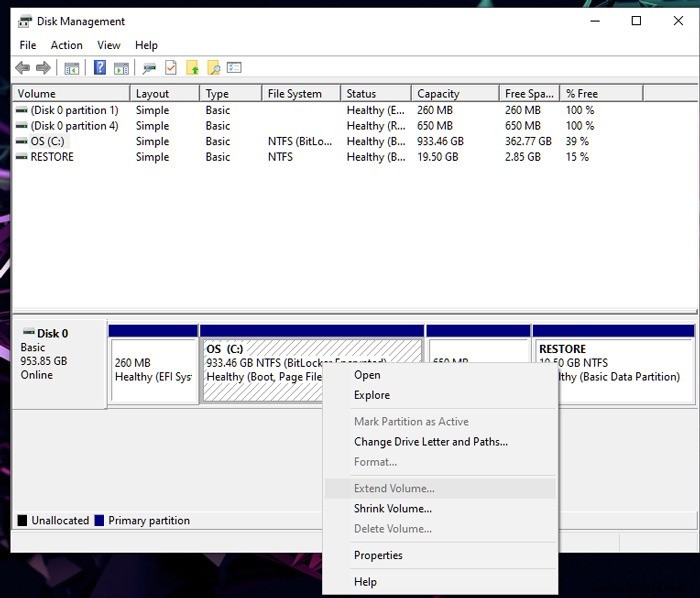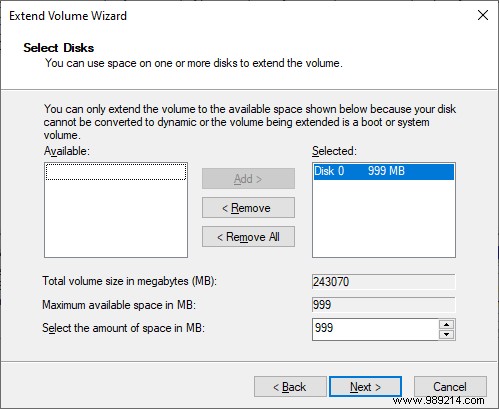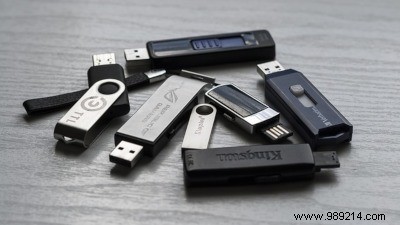When low disk warnings start popping up on your computer, it can only mean one thing:you're running out of disk space. You have to delete something to free up space, but you can't delete any software, files, or folders. In fact, you can't get rid of anything at all! There's only one thing you can do:expand the current space you have to store everything. But how do you expand your PC's storage?
Contents1. Extend your hard drive partition2. USB drive3. SD card4. USB hard drive5. Cloud storage services6. Secondary Hard Drive/Solid State Drive7. Wi-Fi Hard Drive / Network StorageMake SpaceLet's take a look at some of the ways you can increase your PC's storage size.
Before you spend your money on new hardware and hard drives, it's worth visiting the hard drive and partition you want to extend to see if you can create more space for it.
First, let's move on to Windows Disk Management. Simply type "disk management" in the start menu search and click "Create and format hard disk partitions".
In the new window, check the "File System" for the hard drive partition you want to extend.

In the next window, choose the volumes you want to extend, "add" them to the selected partition, then click Next and follow the instructions.

Typical storage space:8 – 128 GB

USB drives are one of the most reliable ways to store computer stuff. Just plug one into a USB port, open it on your computer, then drag files onto the drive itself. It's easy to carry, stores lots of data, and can be plugged into any computer with a USB port (which is the biggest one!).
Typical storage space:2 to 128 GB
SD cards are in the same vein as USB drives but are a bit more conditional on whether you can put them in a PC or not. Unlike USB drives, an SD card slot is not a guarantee on most machines. This is usually something a laptop will have rather than a PC. As such, if you're only using an SD card on one device, it'll do just fine. Porting data to another machine, however, can be tricky.
Typical storage space:1-4TB
Did you know that you can connect a second hard drive via the USB ports? You do have to use a hard drive enclosure though, but it's definitely one of the easiest ways to dramatically expand your storage. USB hard drives are a fantastic choice for storing media files and games. Even better, you can take them with you and plug them into other PCs to export the data.
Typical storage space:2-1TB
Everything is moving to the cloud these days, and your data can participate! There are many different cloud storage servers, but the most popular are Dropbox, OneDrive, and Google Drive. pCloud is also another good solid option.
It's easy to start using cloud storage:create an account, then upload your files to the cloud online. You can then delete the files from your hard drive and free up space without completely losing your files. In fact, they will be accessible on all your devices that can access the cloud! If you have confidential data, there is cloud storage, like pCloud, which provides additional encryption to prevent others from accessing your data.
Typical storage space:1-4TB (HDD), 128-512GB (SSD)
If you have free space on your motherboard, you can forego transferring data and just get a second drive to store stuff. A second hard drive can act as a "mule" drive, storing large files such as movies and recordings. Running an SSD in tandem with a hard drive also works well:just put all the software you want to load quickly onto the SSD and enjoy faster load times.
Typical storage space:1-4TB
USB hard drives are great, but sometimes you want to keep those USB ports free. Wi-Fi hard drives and sometimes network attached storage (NAS) are often marketed as "home clouds" and connect to other devices over a Wi-Fi connection. This has the added benefit of being accessible by anyone who connects to the router, meaning you can set one up for your family or workplace. Some even allow access to the hard drive via a web interface!
If you can't delete your files to make room, don't worry! There are plenty of ways to free up space and expand your PC's storage, depending on what you're trying to store.
For more hard drive tips, see how to check your hard drive health in Windows 10 and our list of things to do when you get a new SSD.